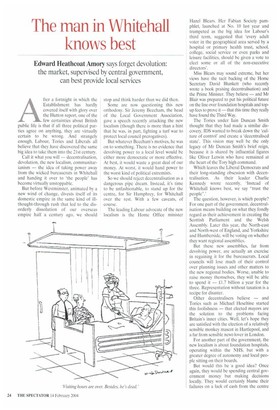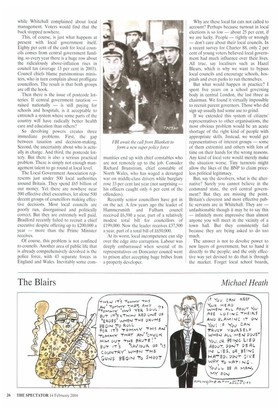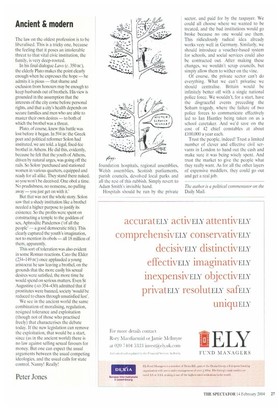The man in Whitehall knows best
Edward Heathcoat Amory says forget devolution: the market, supervised by central government, can best provide local services After a fortnight in which the Establishment has hardly covered itself with glory over the Hutton report, one of the few certainties about British public life is that if all three political parties agree on anything, they are virtually certain to be wrong. And strangely enough, Labour, Tories and Liberals all believe that they have discovered the same big idea to take them into the 21st century.
Call it what you will — decentralisation, devolution, the new localism, communitarianism — the idea of taking power away from the wicked bureaucrats in Whitehall and handing it over to 'the people' has become virtually unstoppable.
But before Westminster, animated by a new wind of change, divests itself of its domestic empire in the same kind of illthought-through rush that led to the disorderly dissolution of our overseas empire half a century ago, we should
stop and think harder than we did then.
Some are now questioning this new orthodoxy. Sir Jeremy Beecham, the head of the Local Government Association, gave a speech recently attacking the new localism (though there is more than a hint that he was, in part, fighting a turf war to protect local council prerogatives).
But whatever Beecham's motives, he was on to something. There is no evidence that devolving power to a local level would be either more democratic or more effective. At best, it would waste a great deal of our money. At worst, it would hand power to the worst kind of political extremists.
So we should reject decentralisation as a dangerous pipe dream. Instead, it's time to be unfashionable, to stand up for the centre, for Sir Humphrey, for Whitehall over the rest. With a few caveats, of course.
The leading Labour advocate of the new localism is the Home Office minister
Hazel Blears. Her Fabian Society pamphlet, launched at No. 10 last year and trumpeted as the big idea for Labour's third term, suggested that 'every adult voter in the geographical area served by a hospital or primary health trust, school, college, social service or even parks and leisure facilities, should be given a vote to elect some or all of the non-executive directors'.
Miss Blears may sound extreme, but her views have the tacit backing of the Home Secretary David Blunkett (who recently wrote a book praising decentralisation) and the Prime Minister. They believe — and Mr Blair was prepared to put his political future on the line over foundation hospitals and topup fees to prove it — that this time they really have found the Third Way.
The Tories under kin Duncan Smith thought that they had made a similar discovery. IDS wanted to break down the 'culture of control' and create a 'decentralised state'. This vision may well be the only legacy of Mr Duncan Smith's brief reign, because it is shared by influential figures like Oliver Letwin who have remained at the heart of the Tory high command.
Which leaves the Liberal Democrats and their long-standing obsession with decentralisation. As their leader Charlie Kennedy wrote recently, 'Instead of Whitehall knows best, we say "trust the people".'
The question, however, is which people? For one part of the government, decentralisation means building on what they fondly regard as their achievement in creating the Scottish Parliament and the Welsh Assembly. Later this year, the North-east and North-west of England, and Yorkshire and Humberside, will be voting on whether they want regional assemblies.
But these new assemblies, far from devolving power, are actually an exercise in regaining it for the bureaucrats. Local councils will lose much of their control over planning issues and other matters to the new regional bodies. Worse, unable to raise money themselves, they will be able to spend it — £1.7 billion a year for the three. Representation without taxation is a recipe for disaster.
Other decentralisers believe — and Tories such as Michael Heseltine started this foolishness — that elected mayors are the solution to the problems facing Britain's inner cities. Well, let's hope they are satisfied with the election of a relatively sensible monkey mascot in Hartlepool, and a far from sensible newt-lover in London.
For another part of the government, the new localism is about foundation hospitals, operating within the NHS, but with a greater degree of autonomy and local people sitting on their boards.
But would this be a good idea? Once again, they would be spending central government money but making decisions locally. They would certainly blame their failures on a lack of cash from the centre
while Whitehall complained about local management. Voters would find that the buck stopped nowhere.
This, of course, is just what happens at present with local government itself. Eighty per cent of the cash for local councils comes from central government funding. so every year there is a huge row about the ridiculously above-inflation rises in council tax (average 13 per cent in 2003). Council chiefs blame parsimonious ministers, who in turn complain about profligate councillors. The result is that both groups are off the hook.
Then there is the issue of postcode lotteries. If central government taxation — raised nationally — is still paying for schools and hospitals, is it acceptable to entrench a system where some parts of the country will have radically better health care and education than others?
So devolving powers creates three immediate problems. First, the gap between taxation and decision-making. Second, the uncertainty about who is actually in charge. And third, the postcode lottery. But there is also a serious practical problem. There is simply not enough management talent to go round at local level.
The Local Government Association represents just under 500 local authorities around Britain. They spend £65 billion of our money. Yet there are nowhere near 500 effective chief executives, let alone 500 decent groups of councillors making effective decisions. Most local councils are poorly run, disorganised and politically correct. But they are extremely well paid. Bradford recently failed to recruit a chief executive despite offering up to £200,000 a year — more than the Prime Minister receives.
Of course, this problem is not confined to councils. Another area of public life that is already comprehensively devolved is the police force, with 43 separate forces in England and Wales. Inevitably some corn munities end up with chief constables who are not remotely up to the job. Consider Richard Brunstrom, chief constable of North Wales, who has waged a deranged war on middle-class drivers while burglary rose 33 per cent last year (not surprising — his officers caught only 6 per cent of the offenders).
Recently senior councillors have got in on the act. A few years ago the leader of Hammersmith and Fulham council received £6,500 a year, part of a relatively modest total bill for councillors of £199,000. Now the leader receives £37,500 a year, part of a total bill of £650,000.
At its worst, local incompetence can slip over the edge into corruption. Labour was deeply embarrassed when several of its representatives on Doncaster council went to prison after accepting huge bribes from a property developer. Why are these local fat cats not called to account? Perhaps because turnout in local elections is so low — about 25 per cent, if we are lucky. People — rightly or wrongly — don't care about their local councils. In a recent survey for Charter 88, only 2 per cent of young voters believed local government had much influence over their lives. All true, say localisers such as Hazel Blears, which is why we want to bypass local councils and encourage schools, hospitals and even parks to run themselves.
But what would happen in practice? I spent five years on a school governing body in central London, the last three as chairman. We found it virtually impossible to recruit parent governors. Those who did sign up usually had some axe to grind.
If we extended this system of citizens' representatives to other organisations, the most obvious problem would be an acute shortage of the right kind of people with appropriate skills. Instead, we would get representatives of interest groups some of them extremist and others with lots of time on their hands for the wrong reasons. Any kind of local vote would merely make the situation worse. Tiny turnouts might allow the likes of the BNP to claim priceless political legitimacy.
But, say the devolvers, what is the alternative? Surely you cannot believe in the command state, the evil central government? But they are missing the point. Britain's cleverest and most effective public servants are in Whitehall. They are — unfashionable though it may be to say this — infinitely more impressive than almost anyone you will meet in the vicinity of a town hall. But they consistently fail because they are being asked to do too much.
The answer is not to devolve power to new layers of government, but to hand it directly to the people; and the only effective way yet devised to do that is through the market. Forget local school boards, foundation hospitals, regional assemblies, Welsh assemblies, Scottish parliaments, parish councils, devolved local parks and all the rest of this rubbish. Simply revert to Adam Smith's invisible hand.
Hospitals should be run by the private sector, and paid for by the taxpayer. We could all choose where we wanted to be treated, and the bad institutions would go broke because no one would use them. This ridiculously radical idea already works very well in Germany. Similarly, we should introduce a voucher-based system for schools, and social services could also be contracted out. After making these changes, we wouldn't scrap councils, but simply allow them to wither on the vine.
Of course, the private sector can't do everything. What we can't privatise we should centralise. Britain would be infinitely better off with a single national police force. We wouldn't, for a start, have the disgraceful events preceding the Soham tragedy, where the failure of two police forces to communicate effectively led to Ian Huntley being taken on as a school caretaker. And we'd save on the cost of 42 chief constables at about .€100,000 a year each.
Trust the people. indeed! Trust a limited number of clever and effective civil servants in London to hand out the cash and make sure it was being wisely spent. And trust the market to give the people what they really want. As for all the other layers of expensive meddlers, they could go out and get a real job.
The author is a political commentator on the Daily Mail,




































































 Previous page
Previous page